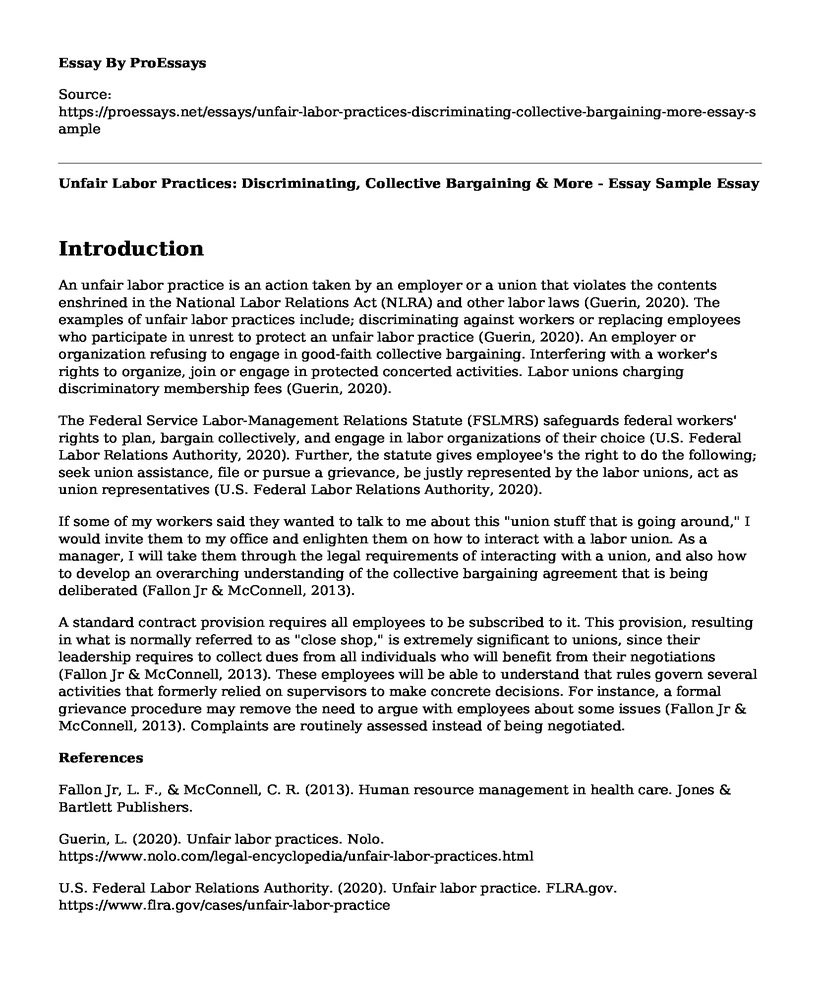Introduction
An unfair labor practice is an action taken by an employer or a union that violates the contents enshrined in the National Labor Relations Act (NLRA) and other labor laws (Guerin, 2020). The examples of unfair labor practices include; discriminating against workers or replacing employees who participate in unrest to protect an unfair labor practice (Guerin, 2020). An employer or organization refusing to engage in good-faith collective bargaining. Interfering with a worker's rights to organize, join or engage in protected concerted activities. Labor unions charging discriminatory membership fees (Guerin, 2020).
The Federal Service Labor-Management Relations Statute (FSLMRS) safeguards federal workers' rights to plan, bargain collectively, and engage in labor organizations of their choice (U.S. Federal Labor Relations Authority, 2020). Further, the statute gives employee's the right to do the following; seek union assistance, file or pursue a grievance, be justly represented by the labor unions, act as union representatives (U.S. Federal Labor Relations Authority, 2020).
If some of my workers said they wanted to talk to me about this "union stuff that is going around," I would invite them to my office and enlighten them on how to interact with a labor union. As a manager, I will take them through the legal requirements of interacting with a union, and also how to develop an overarching understanding of the collective bargaining agreement that is being deliberated (Fallon Jr & McConnell, 2013).
A standard contract provision requires all employees to be subscribed to it. This provision, resulting in what is normally referred to as "close shop," is extremely significant to unions, since their leadership requires to collect dues from all individuals who will benefit from their negotiations (Fallon Jr & McConnell, 2013). These employees will be able to understand that rules govern several activities that formerly relied on supervisors to make concrete decisions. For instance, a formal grievance procedure may remove the need to argue with employees about some issues (Fallon Jr & McConnell, 2013). Complaints are routinely assessed instead of being negotiated.
References
Fallon Jr, L. F., & McConnell, C. R. (2013). Human resource management in health care. Jones & Bartlett Publishers.
Guerin, L. (2020). Unfair labor practices. Nolo. https://www.nolo.com/legal-encyclopedia/unfair-labor-practices.html
U.S. Federal Labor Relations Authority. (2020). Unfair labor practice. FLRA.gov. https://www.flra.gov/cases/unfair-labor-practice
Cite this page
Unfair Labor Practices: Discriminating, Collective Bargaining & More - Essay Sample. (2023, Apr 01). Retrieved from https://proessays.net/essays/unfair-labor-practices-discriminating-collective-bargaining-more-essay-sample
If you are the original author of this essay and no longer wish to have it published on the ProEssays website, please click below to request its removal:
- Essay Sample on Globalization: A Closer Look
- Fake News Discussion
- Why Boys Should Go to Engineering Schools, Why Girls Should Go to Nursing?
- Global Cities and Governance Essay Example
- Essay Sample on Montgomery Bus Event
- Essay Example on Venezuela: A Struggling Nation of Poverty and Culture Shock
- Media and Racism: 40 Years of Discrimination - Essay Sample







